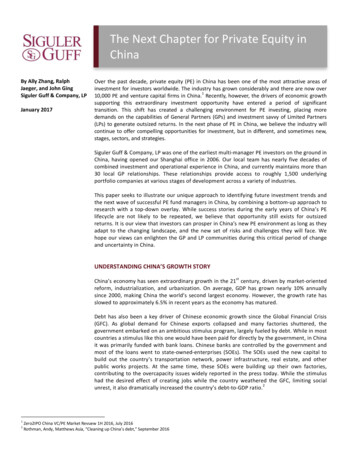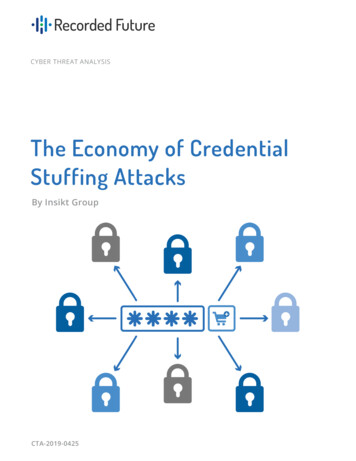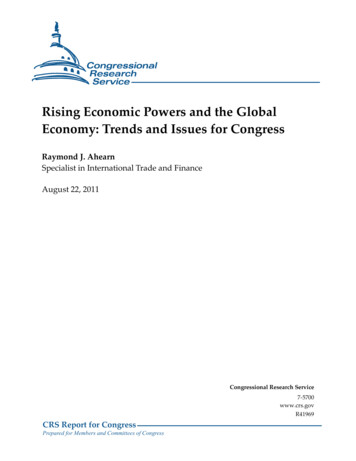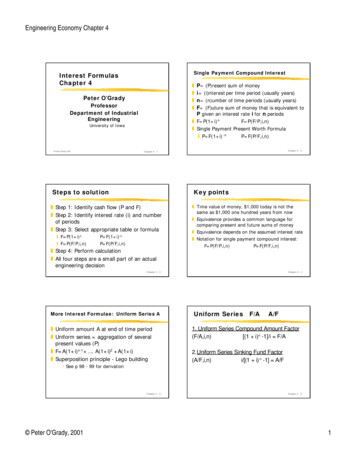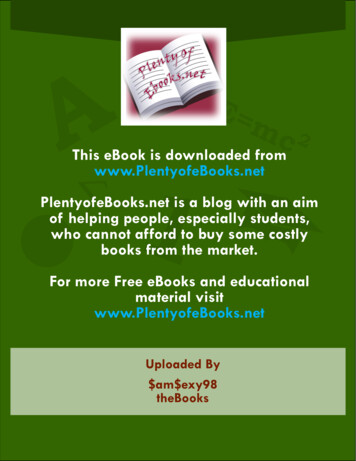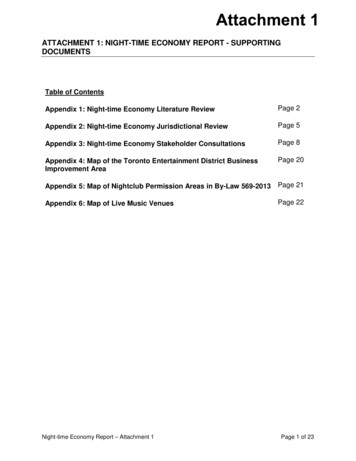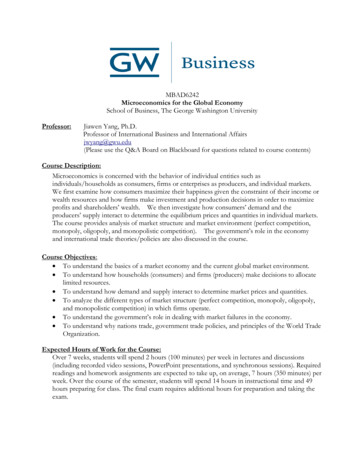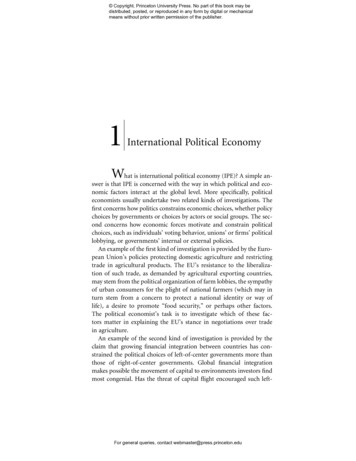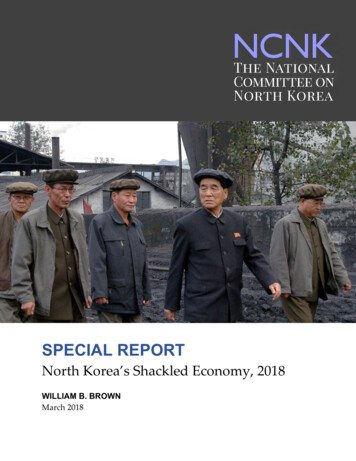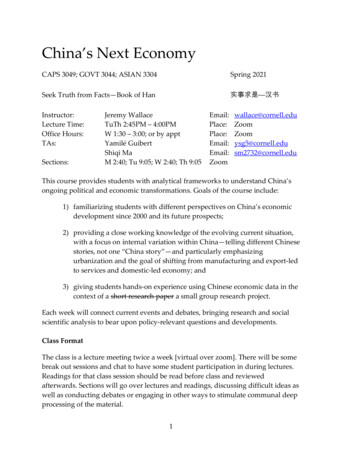
Transcription
China’s Next EconomyCAPS 3049; GOVT 3044; ASIAN 3304Spring 2021Seek Truth from Facts—Book of Han实事求是—汉书Instructor:Lecture Time:Office Hours:TAs:Sections:Jeremy WallaceTuTh 2:45PM – 4:00PMW 1:30 – 3:00; or by apptYamilé GuibertShiqi MaM 2:40; Tu 9:05; W 2:40; Th his course provides students with analytical frameworks to understand China’songoing political and economic transformations. Goals of the course include:1) familiarizing students with different perspectives on China’s economicdevelopment since 2000 and its future prospects;2) providing a close working knowledge of the evolving current situation,with a focus on internal variation within China—telling different Chinesestories, not one “China story”—and particularly emphasizingurbanization and the goal of shifting from manufacturing and export-ledto services and domestic-led economy; and3) giving students hands-on experience using Chinese economic data in thecontext of a short research paper a small group research project.Each week will connect current events and debates, bringing research and socialscientific analysis to bear upon policy-relevant questions and developments.Class FormatThe class is a lecture meeting twice a week [virtual over zoom]. There will be somebreak out sessions and chat to have some student participation in during lectures.Readings for that class session should be read before class and reviewedafterwards. Sections will go over lectures and readings, discussing difficult ideas aswell as conducting debates or engaging in other ways to stimulate communal deepprocessing of the material.1
Assignments and GradesGrades in the class are based on performance from seven parts, as shown below.Reading Check-insParticipationMidterm10%20%25%News PresentationBlog PostsResearch Paper Project5%10%30%Reading Check-ins – Short answer questions about that week’s readings,distributed on Canvas to help discussion quickly get through the basics ofthe material and into deeper issues.News Presentation – Students present a news item in section and also turn in asingle-spaced, one page ( 500 words) description of the issue, relevantplayers, potential biases in the coverage, etc.Participation – Attendance at lecture is required, as is active participation indiscussion section.Blog Posts – Each student will write 2 responses of 300 words each during thesemester. Responses synthesize the readings of the week.Midterm Exam – The midterm will cover material from the lectures, readings, andsections that occur prior to the exam. The exam will include identifications,short answers, and essay questions.Research Project – By the assigned final project date, students are expected to turnin a small-group research project. A handout with more details (group size,expectations, topics) will be circulated early in the semester.This is a COVID semester (hopefully our final one!). Grading will be generousassuming completion of assignments. Grading is based upon (a) accuracy offactual information; (b) ability to synthesize the appropriate evidence, boththeoretical and empirical, not just rehashing the texts; (c) judgment in separatingthe important from the trivial & critically evaluating all assumptions [includingyour own and mine]; and (d) effective expression.PrerequisitesThe course has no formal prerequisites. Students will come into the class withdiverse backgrounds: some will have grown up in China, while others havestudied related subject matters before. Regardless, China’s ongoingtransformations are ongoing, and students will need to engage the readings andassignments of this class to excel. Students with a background in comparativepolitics (e.g. GOVT 1313 Introduction to Comparative Politics), China (ASIAN 22122
Introduction to China), Chinese politics (CAPS 3403 China Under Revolution andReform), China’s economic history (ECON 3380 China’s Economy under Mao andDeng), or related classes will be at a relative advantage.Integrity & AccommodationEvery student is expected to abide by the University’s Code of Academic Integrity.All written assignments will be solely the work of the student. Cheating andplagiarism will be dealt with according to university regulations. In compliancewith university policy and equal access laws, I am available to discuss appropriateacademic accommodations that may be required for a student with disabilities.ReadingsAll of the readings are linked or on Canvas. There are no required textbooks, but China’sEconomy: What Everyone Needs to Know, The Chinese Economy, and Governing China,among others, can help provide background for those without it.In addition to listed readings, links to relevant news pieces will be sent by Canvas. Thematerial that students read in this class come from a variety of sources and areproduced for a variety of audiences. One goal of the course is for students to come awaywith an improved ability to understand the explicit and implicit arguments that aremade in scholarly work, policy documents, political campaigns, governmentpronouncements, and mass media about China and the Chinese economy.Course ScheduleIntroduction – Feb. 9Censorship and Self-CensorshipFeb. 11[1] Perry Link. 2002. “The Anaconda in the Chandelier.” NY Review of Books.[2] Gary King, Jennifer Pan, & Margaret Roberts. 2014. “Reverse-EngineeringCensorship in China: Randomized Experimentation and ParticipantObservation.” Science.[3] Eric X. Li. 2012. “Why China’s Political Model is Superior.” NYT.3
China’s Growth in Comparison & China 2030Feb. 16, 18[1] Arthur Kroeber. 2016. China’s Economy: What Everyone Needs to Know. Ch. 1.[2] World Bank. 2012. China 2030: Building a Modern, Harmonious, and CreativeHigh-Income Society. Overview and Selections.China 3.0 & BeaconismFeb. 23, 25[1] Mark Leonard (ed). 2012. China 3.0. Selections.[2] Yao Lin. 2021. “Beaconism and the Trumpian Metamorphosis of ChineseLiberal Intellectuals.” Journal of Contemporary China. pp. 85–101.Government Work Reports and PlansMar. 2, 4[1] Li Keqiang. 2020. “2020 Government Work Report.”[2] Scott Kennedy & Christopher Johnson. 2016. “Perfecting China, Inc.” CSIS.[3] 14th Five Year Plan Analysis TBD.Labor[Mar. 9 No class] Mar. 11[1] Mary Gallagher. 2014. “China’s Workers Movement & the End of the RapidGrowth Era.” Daedelus. 143(2): 81-95.[2] Gerry Shih. 2019. “If I disappear.” Washington Post.[3] Renwu. 2020. “Delivery Workers, Trapped in the System.” Translated byChuancn.org. tion/Chinese CapitalismsMar. 16, 18[1] Eli Friedman. 2020. “Why China is Capitalist.” Spectre pitalist/[2] Margaret Pearson, Meg Rithmire, and Kellee S Tsai. 2020. “Party-StateCapitalism in China.” Harvard Business School Working Papers.[3] Jude Blanchette. 2020. “CCP, Inc.” China Leadership Monitor.4
UrbanizationMar. 23, 25[1] Kristen Looney & Meg Rithmire. 2016. “Urbanization with ChineseCharacteristics? China’s Gamble for Modernization.”[2] Max Woodworth & Jeremy Wallace. 2017. “Seeing Ghosts: Parsing China's‘Ghost City’ Controversy.”[3] Shiqi Ma and Jeremy Wallace. 2020. “Shifting Sands: The 2017 BeijingDemolitions in Context.”DebtMar. 30[1] McKinsey Global Institute. 2015. Debt and (not much) Deleveraging.[2] Arthur Kroeber. 2016. China’s Economy: What Everyone Needs to Know. Ch. 12.[3] Houze Song 2021. “Macro Outlook: Return of De-Risking Focus Will HurtNear-Term Growth.” MacroPolo.MidtermApr. 1Environment IApr. 6, 8[1] Rachel Stern. 2011. “From Dispute to Decision: Suing Polluters in China.”The China Quarterly. 206: 294—312.[2] Wang Jin. 2010. “China’s Green Laws are Useless.” China Dialogue.[3] Ye Qi et al. 2016. “China’s Post-Coal Growth.” Nature Geoscience. 564-566.[4] Tianjie Ma. 2019. “How Green Is China?” New Internationalist.[5] Matthew Walsh. 2019. “Red, Dead, Renewed.” The Sixth Tone.Environment IIApr. 13, 15[1] Barbara Finamore. 2018. Will China Save the Planet? Polity Press. Selections.[2] Yifei Li & Judith Shapiro. 2020. China Goes Green. Polity Press. Selections.[3] Adam Tooze. 2020. “Did Xi Just Save the World?” Foreign Policy.5
Anti-Corruption & the New NormalApr. 20, 22[1] Diana Fu and Greg Distelhorst. 2018. “Grassroots Participation andRepression under Hu Jintao & Xi Jinping.” The China Journal. 79:100-122.[2] Alice Miller. 2018. “Only Socialism Can Save China; Only Xi Jinping CanSave Socialism.” China Leadership Monitor.[3] Ling Li. 2019. “Politics of Anticorruption in China: Paradigm Change of theParty’s Disciplinary Regime, 2012—2017.” Journal of Contemporary China115: 47–63.[4] Jeremy Wallace. 2020. “The New Normal: A Neopolitical Turn in China'sReform Era.” In Citizens and the State in Authoritarian Regimes: ComparingChina and Russia.CrackdownsApr. 27, 29[1] Adrian Zenz. 2018. “’Thoroughly Reforming them Toward a Healthy HeartAttitude’ - China's Political Re-Education Campaign in Xinjiang”[2] Diana Fu. 2017. “Why is Beijing Afraid of Chinese Feminists?” Wash Post.[3] Hong Kong. TBD.China and the WorldMay 4, 6[1] Trade War. TBD.[2] Belt and Road. TBD.[3] Sarah Cook. 2020. “Beijing’s Global Megaphone: The Expansion of ChineseCommunist Party Media Influence since 2017.” Freedom House Report.ConclusionsMay 11, 13[1] TBDFinal Project Due: May 19, 20206
Introduction to China), Chinese politics (CAPS 3403 China Under Revolution and Reform), China’s economic history (ECON 3380 China’s Economy under Mao and Deng), or related classes will be at a relative advantage. Integrity & Accommodation . Every student is expected to abide by the University’s Code of Academi
